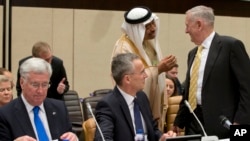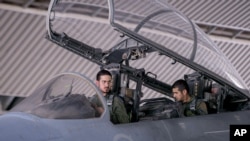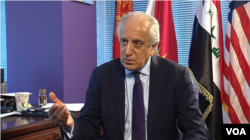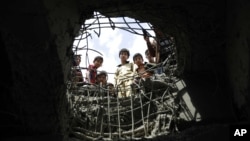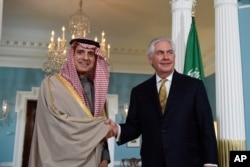Saudi Arabia says it is intensifying cooperation with the United States in fighting Islamic State militants – a move driven by pressure on Riyadh but also its warming ties to a new U.S. administration that shares Saudi concerns about Iran.
Saudi foreign minister Adel al-Jubeir touted his nation’s role in the U.S.-led coalition against the Islamic State, or IS, on a visit to Washington last month. Speaking alongside his U.S. counterpart, Secretary of State Rex Tillerson, Jubeir said Riyadh is “intensifying” its work with the coalition, flying what he called the second largest number of sorties over Syria, after the U.S.
The U.S. Defense Department says the U.S.-led coalition carried out 7,840 airstrikes on IS targets in Syria as of March 28, as part of an operation that began in August 2014. It says U.S. warplanes conducted all but 371 of those strikes, with the remainder conducted by 11 other nations: Australia, Bahrain, Britain, Canada, Denmark, France, Jordan, the Netherlands, Saudi Arabia, Turkey and the UAE.
Non-military efforts
Riyadh also has been highlighting its campaign to stop the flow of Saudi money and recruits to IS. A July 2016 fact sheet posted on the website of the Saudi embassy in Washington says Riyadh is a co-chair, with the U.S. and Italy, of the “Counter ISIL Finance Group,” a coalition established in 2015 to disrupt IS financing.
Other anti-IS steps spotlighted in the Saudi fact sheet include the arrests of 2,800 terror suspects since 2015 and an “aggressive public education campaign by official clerics … to discredit the group.” Tillerson acknowledged the Saudi assistance to the U.S.-led anti-IS coalition when he addressed coalition representatives in Washington on March 22, saying Saudi Arabia and Egypt in particular have “important roles to play in combating the message of IS and other radical Islamic terrorist groups.”
One reason for the U.S. emphasis on Saudi Arabia’s “important role” could be that Riyadh has long faced accusations of fueling the rise of IS in the years before Saudi forces started fighting the group. Critics say the strict form of Islam historically backed by the Saudi ruling family, Wahhabism, served as an inspiration to IS. They also say Riyadh has not done enough to stop the minority of Saudis who support IS from transferring cash to the group.
“The Saudis used to support extremist groups for various reasons – there is no doubt about it,” said Zalmay Khalilzad, former U.S. ambassador to Afghanistan, Iraq and the U.N., in an interview with VOA’s Afghan service in Washington. “And they admit to that.”
Abbas Kadhim, a foreign policy analyst at SAIS-Johns Hopkins, believes Saudi Arabia wants to clean up its image. “Going after IS is part of trying to divert attention from how involved they have been in the genesis of this evil,” Kadhim told VOA Persian in a separate interview.
Saudi officials see such criticism as unfair and point to the domestic crackdown on Islamist militancy as proof of their counter-terrorism agenda.
“The Saudi king and his son, the deputy crown prince, have stated clearly that they regard Sunni Islamist extremism as a threat to themselves,” Khalilzad said. “They are embracing modernization and seeking to distance from the extremist groups, but this is going to take a long time, given their mixed record.”
Regional conflicts
Kadhim said another factor driving Riyadh’s desire to bolster the U.S.-led anti-IS coalition is that the Sunni forces of Saudi Arabia are stretched as they fight Sunni IS militants in Syria and Iranian-backed Shi’ite militants in other regional conflicts. “The Saudis are bogged down on several fronts right now (besides Syria) – one of them is Yemen and the other is Bahrain,” he said.
A Saudi-led coalition has been fighting in Yemen since March 2015, using airstrikes and naval forces against Iran-allied Shi’ite Houthi rebels who control northern Yemen, including the capital Sanaa. Thousands of people have been killed in the conflict. Riyadh also sent hundreds of ground troops to Bahrain in 2011 as part of a Gulf Cooperation Council force to help the island nation’s minority Sunni rulers suppress a sometimes violent uprising by majority Shi’ites. The GCC force remains in place.
In his March 23 remarks alongside Tillerson, Saudi foreign minister Jubeir said Riyadh is “always looking for ways to expand this (anti-IS) coalition.” Kadhim said Jubeir was sending an underlying message. “When Saudis want to bring in other allies, it is just a way to say, ‘we really have given everything when we can give - now it is time to recruit more allies to give you what we cannot provide.’ ”
New US administration
In its first two months, the Trump administration has had several high-level contacts with Saudi leaders, signaling a U.S. desire for a closer Saudi partnership after ties cooled under President Barack Obama, who irked Riyadh by pursuing dialogue and a nuclear deal with its regional foe, Iran.
Khalilzad said President Donald Trump’s tougher stance toward Iran has created an opening for U.S.-Saudi cooperation. “There is a fear in this administration that Iran is becoming too hegemonic, that it is destabilizing the region by supporting militia groups, weakening states and increasing the chance of producing vacuums in which terrorism can grow,” he said. “So to have a balance of power in the region, the U.S. is strengthening support for Saudi Arabia and other states in the region such as Israel.”
But the warming U.S.-Saudi relationship has not removed all disagreements about fighting terrorism, according to Thomas Lippman, an American journalist and analyst at Washington’s Middle East Institute. “The Saudi view of what groups are dangerous militants and what groups are simply fighting the good fight is not necessarily the same as ours,” he told VOA Persian.
A February report by the Belgium-based International Crisis Group said the Saudi-led coalition in Yemen has engaged in “tacit alliances” with Sunni fighters of al-Qaida in the Arabian Peninsula (AQAP) or “at least turned a blind eye to them, as long as they have assisted in attacking the common enemy” – namely, the Shi’ite Houthis. Washington considers AQAP a terrorist group. A Saudi interior ministry official downplayed the significance of the Yemeni branch of al-Qaida last month, saying it has been weakened by attacks from various adversaries.
“Americans have been asking for generations, what is the value of this partnership with a country, Saudi Arabia, whose social, educational, religious and political values are so antithetical to our own,” Lippman said. “And the answer has always been the same -- they have something we need, we have something they need. It’s a transactional partnership and as long as the al-Saud family is in power, it will continue.”
This report was produced in collaboration with VOA’s Persian Service, Afghan Service and Mehdi Jedinia of VOA’s Extremism Watch Desk.




